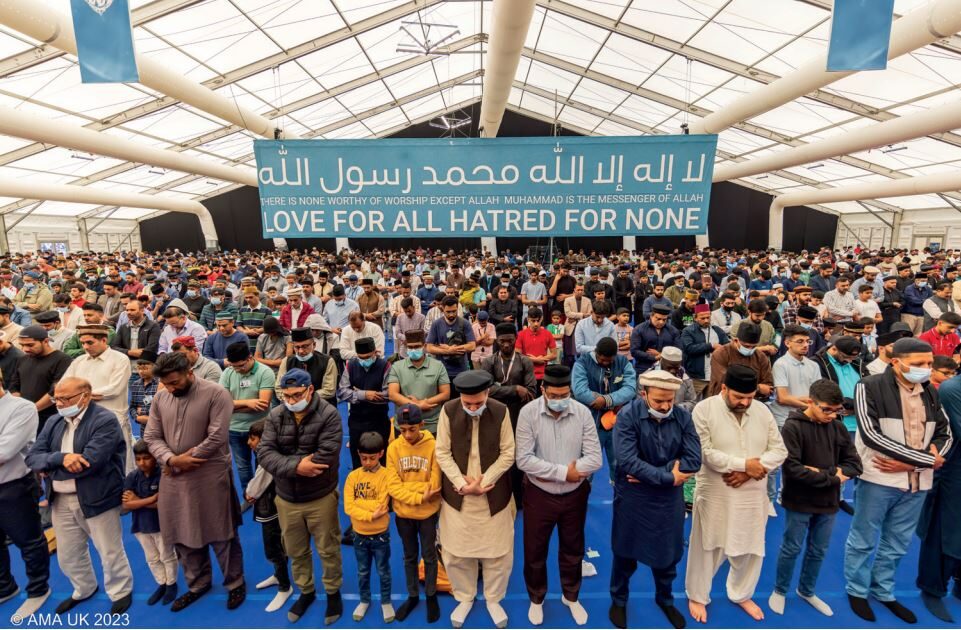Jalees Ahmad, Al Hakam

The Ahmadiyya Muslim Jamaat’s well-known motto, “Love for All, Hatred for None,” is widely recognised by many around the world. It was during the laying of the foundation stone of the Basharat Mosque in Córdoba, Spain, that Hazrat Mirza Nasir Ahmad, Khalifatul Maish IIIrh, introduced this powerful motto.
People often ask how one can live by this motto in a world that seems more divided than the shelves of a busy library during exam season, and it has frequently faced criticism. Questions such as “Is it really possible to live by this motto?” are commonly raised. Below are brief answers to some often asked questions about this motto and its deep roots in Islamic teachings.
1. Does the term “love for all, hatred for none” also include those who are considered bad, evil or unjust?
As Muslims, we are taught to hate the sin, not the sinner. In fact, for those who commit evil actions, Islam teaches us to pray for their guidance. And so, “love” here doesn’t mean supporting or approving their actions; it rather represents wishing for their improvement, betterment, and character development, not moral decay or destruction.
One only needs to study the lives of the likes of Hazrat Umar ibn al-Khattabra, Hazrat Khalid ibn al-Walidra, or even the Holy Prophet’ssa visit to Taif. These well-documented moments in history remind us that redemption, forgiveness, and mercy can begin at any time. Our hearts lie between the two fingers of Allah, and He alone decides when and how they are turned. It is entirely His will.
Allah states, “And repel evil with that which is best. And lo, he between whom and thyself was enmity will become as though he were a warm friend.” (Surah Ha Mim As-Sajdah, Ch.41: V.35)
2. What about those who fight against Islamic values and mock religion?
Again, we don’t love their actions and the values they fight for; however, we still hold compassion in our hearts. The founder of Islam, the Holy Prophetsa prayed for his enemies, those same people who attempted to kill him. And so, we follow that example: respond with patience and pray for guidance. Avoid hatred, as it only breeds more hatred and spreads more darkness.
3. Does this motto mean we should stay silent against injustice?
Absolutely not! Adherence to Islam commands us to stand up for justice even if it be against oneself. “Love for all” simply implies that even when we oppose someone, we do it ethically and with dignity, not with hatred or cruelty.
4. Does this “love” also count non-Muslims and people with no religion?
Unquestionably, yes. Islam values all human beings as creations of God. As Muslims, we believe that just as Allah has rights, so too does His creation. One cannot claim to love Allah without being tender towards His creation. The Holy Quran says there is no compulsion in religion, and we are instructed to treat all with kindness and fairness.
5. What about those who commit crimes or hurt others? How is it possible for one to love such individuals?
It becomes quite simple when viewed with an open mind. We can support justice while still hoping for a person’s reformation. Islam regards and strives for the possibility of repentance and change. And so, love in this motto means not giving up on human potential, for even Allah Himself states: “Say, “O My servants who have committed excesses against their own souls! despair not of the mercy of Allah, surely Allah forgives all sins. Verily He is Most Forgiving, Merciful.” (Surah az-Zumar, Ch.39: V.54)
6. Is this motto not too unrealistic for today’s immoral world?
Maybe to some; however, as Muslims, we believe it’s a principle worth striving for. The Holy Prophetsa turned enemies into brothers through love and patience. That same spirit can still convert hearts today.
7. In a world full of wars and world leaders destroying cities and homes, how does this motto deal with anger or revenge?
As Muslims, our faith permits self-defence and justice; however, it discourages personal vengeance. Islam’s goal is, in fact, higher: to forgive where possible. The Holy Quran calls forgiveness better if done with wisdom:
“Whoso forgives and his act brings about reformation, his reward is with Allah.” (Surah ash-Shura, Ch.42: V.41)
8. Is this motto one that can be followed in times of war or persecution?
It’s certainly most meaningful during hardship. The Ahmadiyya Muslim Jamaat has, for many years, faced persecution while continuing to respond with peace and prayers, not retaliation. That’s how we live by this motto.
9. Doesn’t “loving” everyone make one weak or vulnerable?
Certainly not! In fact, it empowers. It takes true strength to hold onto compassion when others let go. “Love” doesn’t mean passivity; it means opposing hatred, even in resistance. True strength comes when one masters their emotions – when they are able to withhold themselves and control their anger. So, “love” here does not mean that one is weak and therefore does not retaliate. In fact, the very reason we don’t retaliate is because we have strength. And when a person chooses not to retaliate, God’s help comes to support them.
10. Is this motto rooted in Islam?
Of course! It is most certainly deeply rooted in the Holy Quran and the example of the Holy Prophetsa, who was a mercy for all. (Surah al-Anbiya’, Ch.2: V:108) The motto is a reflection of that prophetic mercy. Thus, following this is a way of following and instilling the character of the Holy Prophetsa within ourselves – the one who loved mankind, and who loved its Creator even more.

